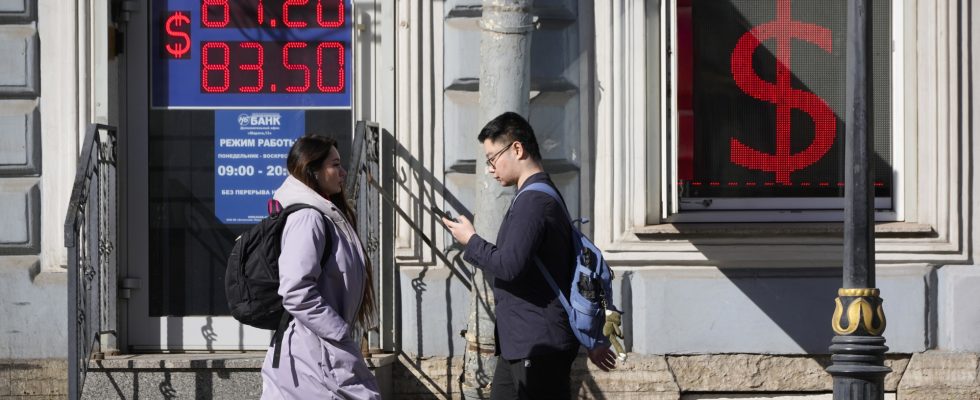Status: 04/07/2023 3:58 p.m
The war of aggression against Ukraine is becoming increasingly expensive for Russia. According to the Russian Ministry of Finance, the budget slipped clearly into the red in the first quarter. At the same time, the ruble depreciates.
The Russian state budget slipped deep into the red in the first three months of the year. According to the Ministry of Finance in Moscow, the deficit from January to March was 2.4 trillion rubles – the equivalent of 26.5 billion euros. For comparison: In the same period of the previous year, the Russian budget still recorded an increase of 1.13 trillion rubles.
A lot of money for armor, less money for energy
The reason for the minus is high armaments expenditure as a result of the war of aggression against Ukraine, coupled with falling income from energy exports. While revenue in the first quarter fell by a good 20 percent to 5.7 trillion rubles compared to the same period in 2022, expenditure rose by 34 percent to 8.1 trillion.
It’s the rising production of military goods – coupled with huge government spending – that keeps Russia’s industry thriving. Both contribute to the fact that the Russian economy does not collapse despite massive sanctions from the West.
Among other things, the Western industrial nations have imposed an embargo on Russian energy sources such as coal and oil. The aim is to make financing the war against Ukraine more difficult. Russia continues to sell fossil fuels, including to India and China – but at a much lower price.
Ruble depreciates massively
At the same time, the Russian ruble is losing massively in value. Its rate fell today to its lowest level against the euro and dollar since April 2022, breaking through the 90 ruble per euro threshold. The reason, traders say, is a slew of problems, including the sale of Western assets to domestic investors, fueling demand for the dollar.
And here, too, oil exports play an important role: they were comparatively low in March, which further reduced Russian income. However, observers assume that the price of oil will rise again as a result of the OPEC+ decision to curb production.
Overall, according to calculations by the Reuters news agency, the ruble has put in the third-worst performance among global currencies so far this year. Only the Egyptian pound and the Argentine peso then depreciated even more.
Rating agency: government debt is increasing
According to analyzes by the European rating agency Scope, there is no end in sight to the negative economic development in Russia. The lower income from energy exports would also increase the hole in the state budget this year, to 3.5 percent of gross domestic product (GDP). In 2022, the deficit was still a good two percent.
However, the Scope analysts assume that the state will initially be able to fill the budget gap without any major problems: “For the time being, Russia can finance its deficit relatively easily by using the National Wealth Fund,” emphasized the rating agency.
However, this is likely to melt: by the end of 2024, the fund will probably only correspond to 3.7 percent of GDP, after it was 10.4 percent at the end of 2021 – i.e. shortly before the outbreak of the war against Ukraine. Another way to plug the budget hole is to issue domestic bonds to state-owned banks.

